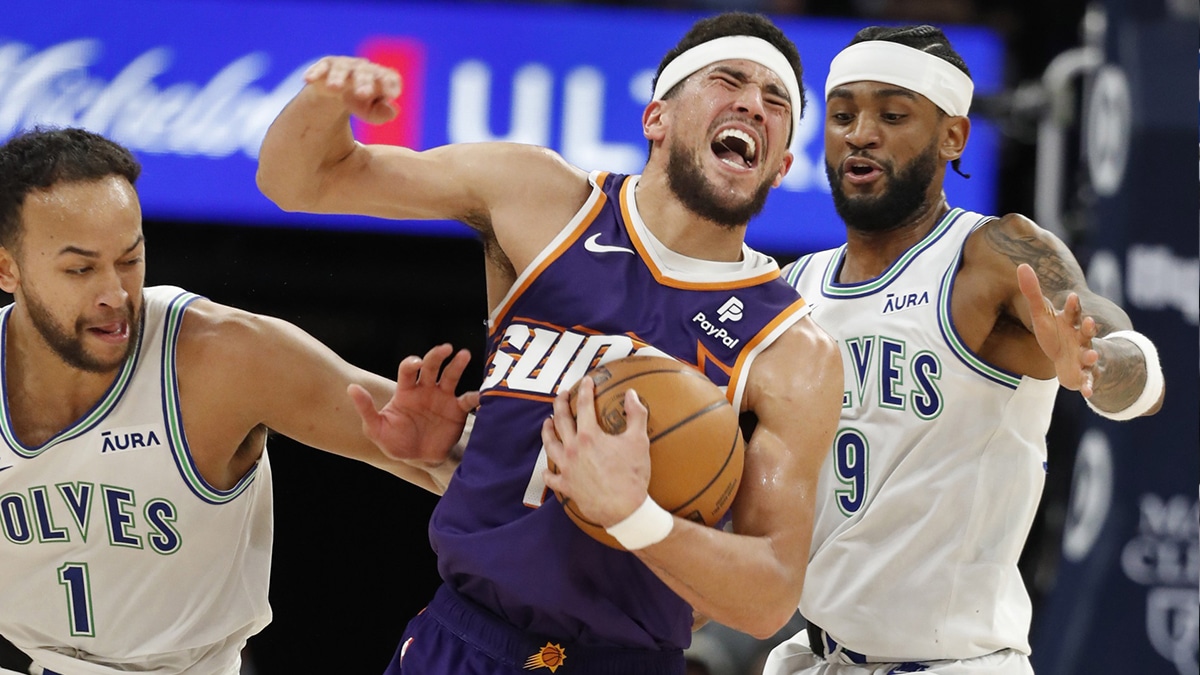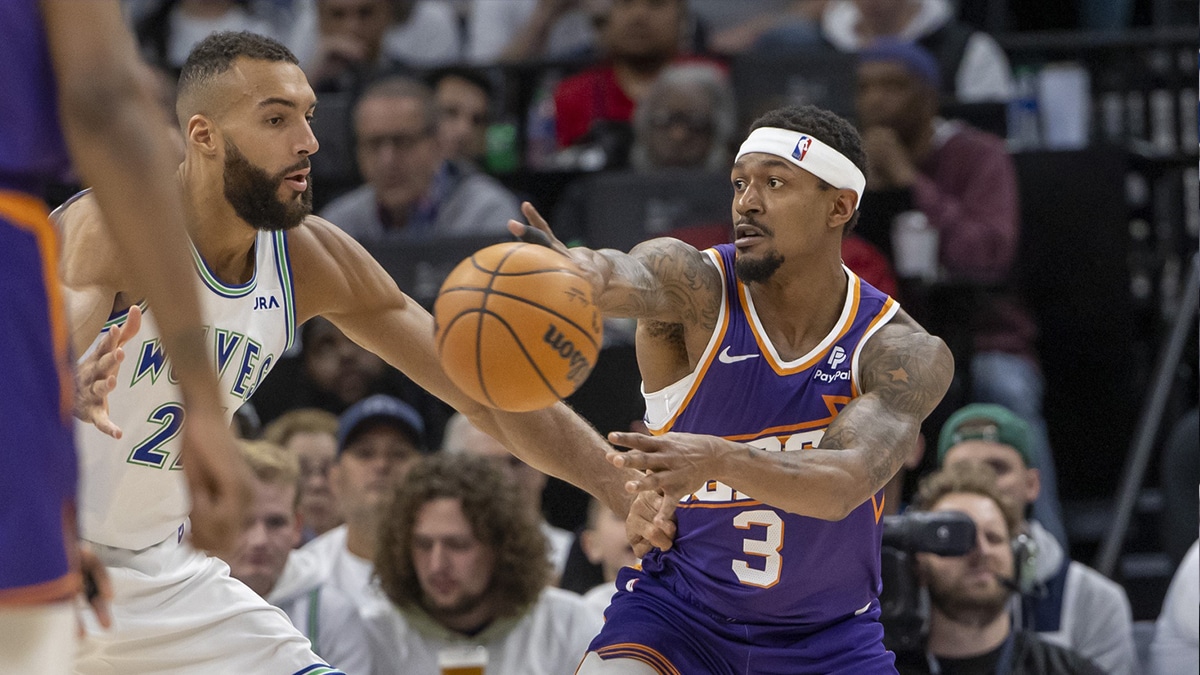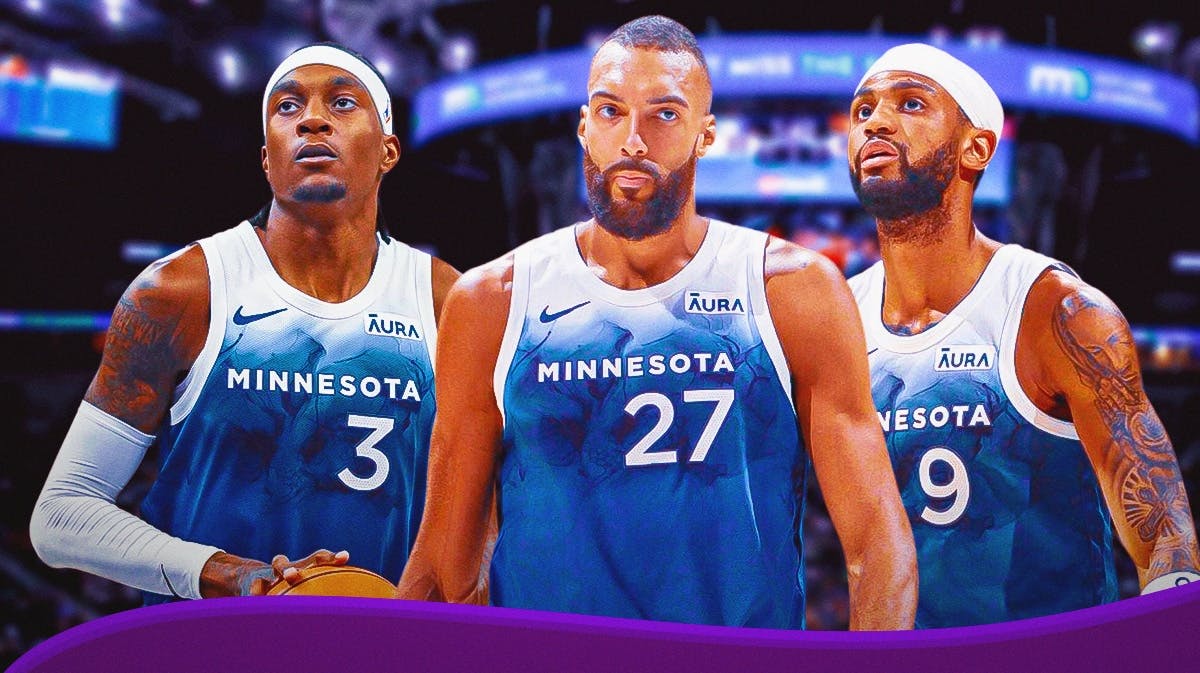The Minnesota Timberwolves sent a message in Game 1 of the first round of the 2024 NBA Playoffs. Playing host to the Phoenix Suns, the Wolves were looking to avenge their 0-3 regular season record against the Suns and their trio of stars. However, Minnesota flexed their might all game long to open the postseason series.
Looking more like their usual caliber of play, the Wolves’ elite defense reigned supreme once again. Minnesota held the Suns to under 100 points in the 120-95 win. This game showed a few essential tweaks Minnesota’s coaching staff made coming into this series to best limit Devin Booker and Bradley Beal offensively.
Rudy Gobert’s defense in the pick-and-roll
The most essential change for Minnesota coming into the series was their pick-and-roll defensive schemes. Rudy Gobert is in line to potentially win his fourth career Defensive Player of the Year, with roughly half of his defensive impact coming directly in the painted area. However, against the Suns in this matchup, his rim deterrence isn’t as necessary as it is against other teams.
As a result, Chris Finch and Minnesota’s coaching staff employed the Timberwolves’ anchor up at the level of the screen far more frequently than they have all season. Not only did Gobert hedge the screens more aggressively, but Minnesota willingly switched its center out in space. During the 82-game season, Minnesota dabbled with defending screens like this, but never fully committed to doing so with high-volume consistency.
However, on Saturday afternoon, Minnesota called upon their 7’1” big man on multiple occasions to defend Bradley Beal, Kevin Durant, and Devin Booker out in isolation. Not only did Gobert survive these situations, he thrived in the challenge. On multiple occasions, the Wolves’ best defender stymied Phoenix’s premier perimeter talent as the unique matchups baited the Suns to rely solely on isolation offense.
Postgame, ClutchPoints asked Coach Finch about Gobert’s work on the defensive end as he rose to the occasion defending some of the best in the league in isolation. Finch praised Gobert’s defensive talent with an emphasis on his ability and willingness to defend on all three scoring levels.
“Rudy’s a really good defender at all levels. He gets down, he’s big, he can move well. He cares, he takes it personally… He’s oftentimes wanting that challenge too.”
Timberwolves’ screen navigation is king

While the Wolves switched up from their typical defensive game plan at times, Minnesota’s core defensive identity remained intact. At the heart of the league’s best defense is two words. “Ball contain”. All season long, Minnesota’s strongest defensive showings came as a result of elite ball contain. Their worst performances were a result of poor ball contain. On Saturday, Minnesota’s defensive masterclass resulted from unbelievably good ball contain as a by-product of elite screen navigation.
Phoenix aggressively hunted open space by continually trying to screen off the Timberwolves’ top-notch perimeter defenders. However, Jaden McDaniels and Nickeil Alexander-Walker were not budging. The two best perimeter stoppers found ways to stay connected to the Suns’ elite shot-makers. NAW and McDaniels erased space by constantly playing tight to the ball handlers.
When Minnesota employed their typical drop coverage, the Wolves still effectively managed to limit the quality of looks for Phoenix’s primary scorers. Behind the mix of switch coverage and drop coverage, the Suns never found a reliable offensive rhythm outside of Durant nailing contested jumpers. Booker and Beal combined to shoot just 11-27 from the field as Alexander-Walker and McDaniels won the first battle of the series.
The Timberwolves’ effort shined through

Scheme and personnel will always be at the center of finding success on the court. Without those elements, effort can’t buy wins. However, when the scheme and personnel mesh, effort is the final ingredient needed to suffocate teams on the defensive end of the floor. For the first time in a while, Minnesota played the game with a desperation and effort level we haven’t seen since early in the season. Postgame, Anthony Edwards shed light on what lit a fire for the Wolves going into Game 1.
“These guys came in here and whooped us in our home court the last game of the season… like Beal said, he told our coach that he don’t think we play hard enough and he was right.”
Edwards then continued to share how Beal’s comments in game 82 fueled the Wolves in the week prior to the start of the playoffs.
“Finchy didn’t like that. He came in the next day was like, ‘You’ve got guys on the other team telling me that you don’t play hard enough for me.’ He was totally right. We were just out there running around, letting them do what they wanna do, man.”
Finch’s players rose to the occasion in Game 1. Not only did they play hard, they dominated Phoenix all game long. While it’s a best-of-seven series, it’s clear that Minnesota’s not playing around. The strong start to the series set the tone as the Suns are left with some soul-searching to find answers for the Wolves’ adjustments.
